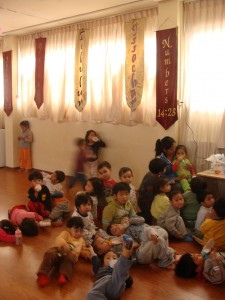 The Guardian, July 20, 2010
The Guardian, July 20, 2010
Michelle is the 14-year-old daughter of undocumented migrant laborers from the Philippines. In fluent Hebrew, she sums up the inhumanity of Israel’s plans to deport children of foreign workers. “It’s like they’re taking sheep and packing them,” she says, comparing the expulsion to herding animals.
While Michelle will probably be naturalized, Israel is set to expel scores of minors, along with their families, to their parents’ country of origin. The criteria that determine who will get residency are rigid and arbitrary. Because of tight age restrictions and an even smaller window to get one’s paperwork turned in—parents will have just three weeks to submit documents that might be impossible to obtain—many children will be left out in the cold.
Hundreds of protestors gathered in Tel Aviv Saturday night to rally against the deportation. The scene was heart-rending. Little girls sat on a ledge, swinging their feet, holding a poster that read, “Don’t deport us.” A young boy gripped a sign with the message, “We are all Israeli children.”
Noa Kaufman, an activist with Israeli Children, a grassroots movement founded specifically to advocate for the kids facing deportation, said that all must be allowed to stay. She remarked that the expulsion would not only damage the families of migrant workers, it would be harmful to Israel, as well, making the country “so white and so ugly.”
It’s a thinly-veiled accusation of ethnic cleansing, something activists have shied away from during the yearlong battle over the issue.
The struggle began last summer when Israel first announced its plans to deport 1200 Israeli-born children, a number that will likely be reduced by the recommendations of a governmental committee. The move, part of a broader crackdown on Israel’s approximately 250,000 undocumented migrant laborers, will be a reversal of the state’s long-held policy against deporting minors. The public was outraged. Massive protests delayed the expulsion until the end of the school year.
While the children were born to non-Jewish parents, they are unequivocally Israeli. They go to local schools, speak fluent Hebrew, and celebrate both national and religious holidays. Their homes often include Shabbat candles, hanukiyot, and kippot, as parents accommodate their assimilated children. Immersed in the culture, the kids profess a love for Israel, a country they embrace as their own.
But Israel, a state of immigrants that has no immigration law besides the Jewish right of return, would prefer to expel them.
Israel began bringing foreign workers in the late 1980s, during the first Initifada, to replace Palestinian day laborers. Now the state claims it wants to reduce its dependency on migrant laborers. But in 2009—the same year that the government announced its intent to deport the children—the state issued a record number of visas for more to come.
Perhaps Interior Minister Eli Yishai was being more honest about the government’s motives when, speaking to the Israeli daily Haaretz, he called the 1200 children a “demographic threat… liable to damage the state’s Jewish identity.” And Yishai showed his true, xenophobic colors when he remarked that migrant workers bring “a profusion of diseases” to Israel.
State policies are similarly racist, revealing a blatant disregard for foreign workers’ humanity. Migrant laborers who fall in love and marry can be stripped of their legal status. Women who bear children must choose between keeping their baby or their visa. If a mother won’t ship her newborn home, she and her child become “illegal” and, now, subject to deportation.
The policies might be shocking but they aren’t surprising—what can be expected of a country that doesn’t recognize its neighbors’ humanity? What can be expected of a state that builds settlements at the expense of peace? What can be expected of a government that subjects 1.5 million Gazans to collective punishment?
The connection between the plight of the children and the Palestinian struggle was apparent Saturday night. Some of the Israeli demonstrators were wearing t-shirts reading “Free Sheikh Jarrah.” Chants common to protests against the separation barrier were used, substituting girosh (deportation) for kibush (occupation).
The scene was a reminder that a state “so white and so ugly” was established long ago—the children are just the latest victims.